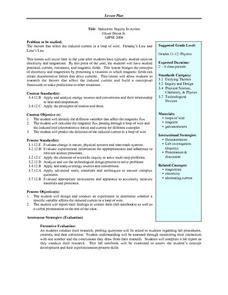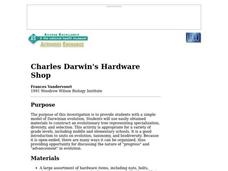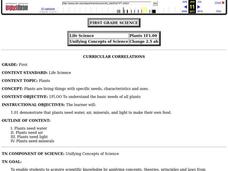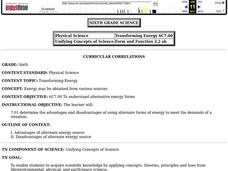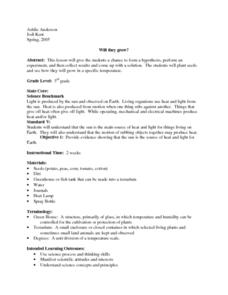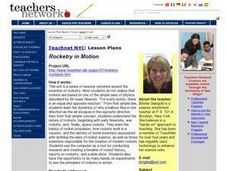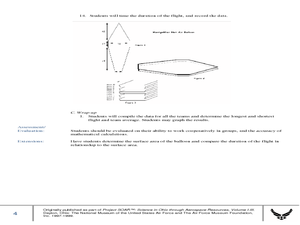Curated OER
Oceanography
Fifth graders study the topography of the ocean floor. They determine its ever changing nature as they examine currents and trade winds. They write paragraph describing how the winds might affect land formations after the discussion of...
Curated OER
Different Types of Orange Juice Contain the Same Amounts of Vitamin C?
Students measure and compare the amount of vitamin C in orange juice samples. They discover the effects of different factors on the concentration of vitamin C. They participate in an experiment to test the orange juice.
Curated OER
pH Readings and Salinity Readings of Water From Three Locations Within the Neponset River Watershed
Sixth graders test the ph levels of water from three different water environments within the Neponset River Watershed. They discuss the three different water environments, take pH measurements of the three samples, and predict which...
Curated OER
What It Is, What It Isn't
Third graders classify and sort different types of beans to be introduced to the classification system in science. As a class, they identify the characteristics of living and non-living organisms and make a chart in their journal to ...
Curated OER
Induction: Inquiry in Action
Students investigate the factors that affect the induced current in a loop of wire. They discuss Faraday's Law and Lenz's Law. Students identify the different variables that affect the magnetic flux and calculate the magnetic flux...
Curated OER
Charles Darwin's Hardware Shop
Students construct an evolutionary tree representing specialization, diversity, and selection using easily obtained materials. They use at least twenty pieces of hardware to classify then develop "evolutionary" relationships between the...
Curated OER
Newton's 2nd Law
Fourth graders discuss Newton's Second Law of Motion, and the acceleration of fast and slow moving objects. They experiment with items with different masses to determine the effect mass has on acceleration using a toy car. They complete...
Curated OER
Machines: Useful But Dangerous
First graders study, observe, and use a simple machine. They study necessary safety and review posted safety rules related to using a machine and identify strategies for reporting any accidents or injuries.
Curated OER
Simple Machines
Fifth graders study how simple machines can help us alter forces and discuss the term mechanical advantage. They then identify dysfunctional simple machines and discuss in groups how the dysfunctions will decrease the effectiveness of each.
Curated OER
Plants
First graders explore the specific needs, characteristics, and uses of plants. They discuss the needs of plants as they grow. Students observe plants in various settings as they grow and note the changes they see.
Curated OER
Transformation of Energy-8th Grade
Eighth graders examine how electricity is produced in relation to the atom as well as what causes electric current to flow and what determines how much current flows through a circuit. These and other concepts of transformation of energy...
Curated OER
Transforming Energy
Sixth graders study about alternate energy sources and discuss with their neighbor how alternative energy sources affect environmental conditions so that an entire species could be affected.
Curated OER
Will they grow?
Third graders plant seeds and see how they will grow in a specific temperature and are questioned about different environments and how they think crops would grow there. They form a hypothesis, perform an experiment, and then collect...
Curated OER
Green Leaves
Third graders, after having conducted one experiment three times, record their observations results in a chart. They predict what hidden colors they believe that a leaf holds. Students record their predictions in their science note books...
Curated OER
Weather Mobile
Young scholars color the lightning part of the thunder cloud and then cut out the pattern. They then cut out the cloud pattern and put cotton onto it with glue. They then fold a piece of paper several times to create a snowflake to which...
Curated OER
Bridges
Ninth graders use model-building to help comprehend the forces and phenomena at work in the world around them. They describe gravity as a universal force that pulls everything toward the center of the earth. Students distinguish between...
Curated OER
Sea Ice Research
Learners study sea ice and its importance in climate and climate change. They discuss sea ice as a presence of a food source for marine animals in the arctic and complete a lab activity. After completing the lab, they watch a video...
Curated OER
Rocketry in Motion
Students investigate why a balloon flies in one direction as air escapes in the opposite direction, which helps them understand the nature of rockets and fireworks. Individually and in teams, students conduct research to create a...
Curated OER
Inventions 2: The Impact
Students research inventors and inventions and their impacts. In this invention lesson, students research inventions and their affects in good and bad ways.
Curated OER
Forces Applied to an Object
Fourth graders predict, observe, and compare what happens when a force is applied to an object. In this forces lesson plan, 4th graders complete a 'swinging hammer' activity to learn about forces and motion.
Curated OER
Science in Your Shopping Cart
Students research the use of science in food production in the United States. In this science and food lesson, students visit a specific website to learn about the science used in various food products for United States consumption.
Curated OER
Up, Up and Away with the Montgolfier Balloon
Young scholars construct hot air balloons. For this science lesson, students assemble their own balloon using tissue paper and glue. They time the duration of the flight, record data and calculate team averages.
Curated OER
Microscopes and Crystals
Students observe crystals under the microscope. In this science lesson, students compare how the crystal look like using their eyes, hand lens and microscope. They identify the type of crystal based on the amount of light they allow to...
Curated OER
Physics Rewind
Eighth graders differentiate speed and velocity. In this physics lesson, 8th graders explain Newton's laws of motion. They calculate speed using a mathematical formula.






